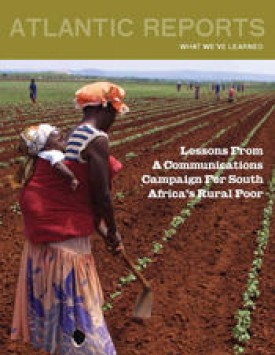What We’ve Learned: Lessons from a Communications Campaign for South Africa’s Rural Poor
Resource type: Research Report
The Atlantic Philanthropies |
This publication focuses on using communications to advance human rights for South Africa’s rural poor. We believe it will be useful for advocates, nonprofit organisations and funders in many countries interested in effectively elevating important human rights issues on the policy agendas of democratic societies.
The publication provides the lessons learned from combining research, activism and communications in The Farm Life Project in South Africa.
Highlights include:
A coalition can be extremely effective through a multifaceted campaign that integrates many tactics. A group of small or large organisations can join forces to increase their effectiveness and raise the visibility of a major social problem. The Farm Life Project partners included researchers, photographers, advocates and service providers who garnered national attention to the plight of farmworkers by commissioning and releasing groundbreaking research, raising awareness, documenting the problem through photography and video, generating media coverage, and communicating directly with political leaders and policymakers.
A communications campaign must be sustained if it is to produce long-term benefits. Budgets must not only be adequate, but strategically allocated to accomplish the goals. The public communications effort that accompanied the release of the National Eviction Survey generated extensive press, and messages about the impact of evictions were clear and consistent. However, this six-month communications campaign was too short. After it ended, the farm dwellers’ plight soon faded from public view.
Co-ordinating a successful communications campaign requires active involvement from participants. The Farm Life Project campaign brought together organisations that had not worked as partners before on an ambitious dissemination effort. Moreover, none of the groups had an in-house communications staff, so a project consultant co-ordinated and oversaw this complex campaign. Key participants needed greater and earlier involvement.
Timing of communication and advocacy efforts are crucial to success. Ideally, a communications effort is both proactive and reactive. Despite its groundbreaking work and attention to the issue, the project evaluators and participants independently pointed out several missed opportunities related to timing.
Effective advocacy requires local voices and strong coalitions. Lobbyists and outside advocates know the policymaking process and can be effective agents for reform. But with solid research data, the powerful stories of the farm families can change minds. The need to mobilise farmworkers and farm dwellers to speak out for themselves was an important lesson of this campaign.
The Farm Life Project is an Atlantic grantee via Centre for Education Policy Development.
